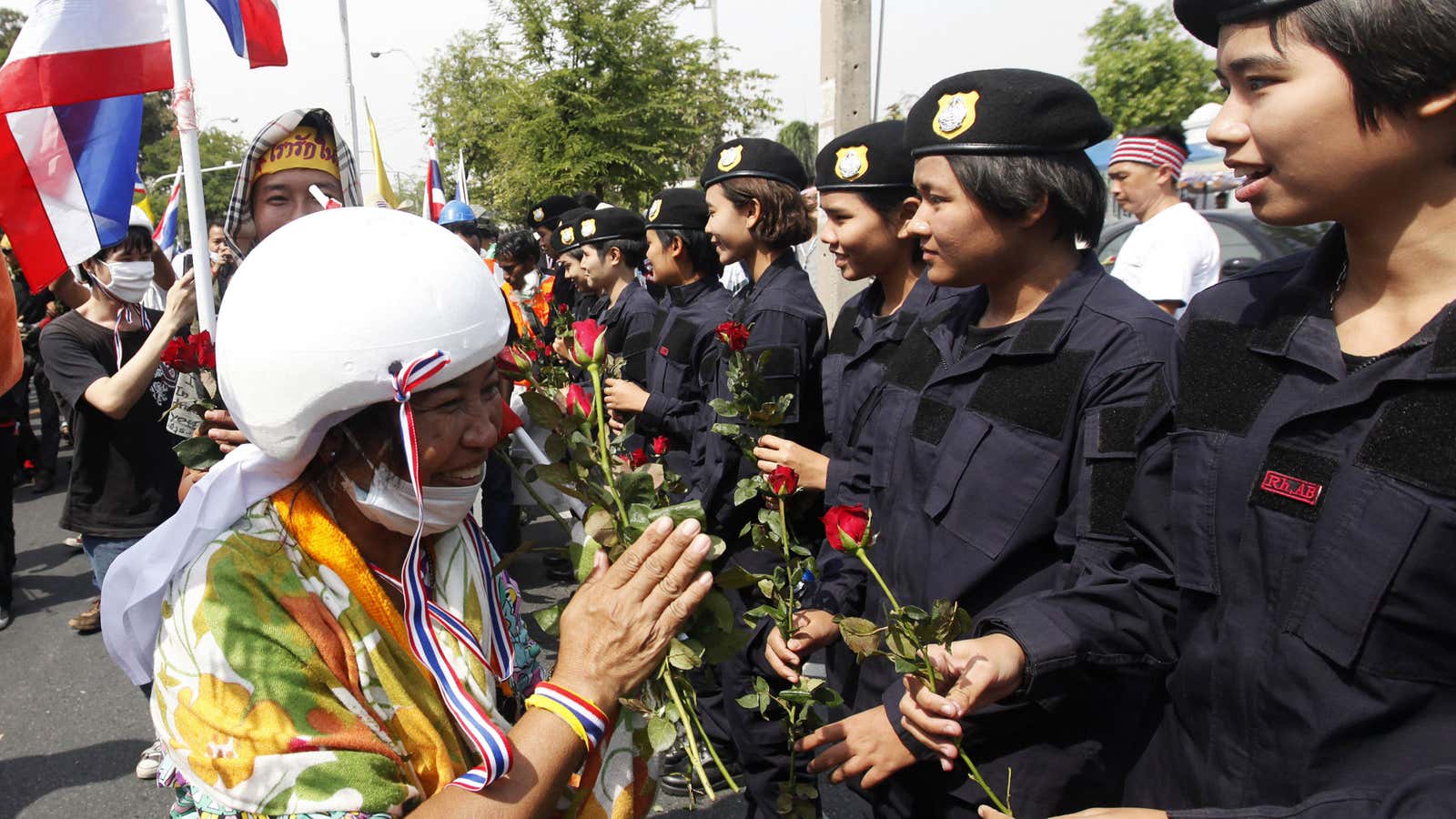BANGKOK, Thailand—After several days of fierce clashes with anti-government protesters, police in Bangkok today (Dec. 3) defused the worst civil unrest to hit the country in three years by simply standing down—and presenting their opponents with red roses.
Police outside the Met Police HQ waiting to greet protesters – with red roses! pic.twitter.com/IiXgZ73tBN
— Andrew R.C. Marshall (@Journotopia) December 3, 2013
In a bizarre turn that follows an apparent agreement between leaders on both sides, authorities removed massive barriers blocking government offices and the Bangkok police headquarters. This allowed demonstrators to stream into the sites, though they didn’t overrun the buildings. Rather, they mingled outside before departing for another rally site—but not before posing for photos with the very police they’d been fighting.
What is better than an selfie? A photo with the police u have been fighting against pic.twitter.com/RLZkZjpntE h/t @news1005fm
— bangkokpundit (@bangkokpundit) December 3, 2013
It may look like peace has miraculously broken out in Thailand, but this is just the latest twist in what is a complex political conflict. Consider the following:
It’s partly a face-saving move
In Thailand, anti-government protest groups often employ a tactic in which they try to create chaos by blocking roads or occupying government buildings in an attempt to provoke a reaction from security forces. This way, the thinking goes, the government will be discredited by committing violence against its own citizens. Today’s apparent accommodation provides a reprieve for the government after unrest that killed at least three and injured scores. And the protesters can claim “victory,” even though Yingluck Shinawatra, the prime minister they despise, has not quit.
It’s a temporarily lull in a bigger social battle
The demonstrators, many of whom hail from Bangkok’s elite and middle classes, have deep grievances. They insist that Yingluck is merely a proxy for her corrupt, money-hungry brother, former prime minister Thaksin Shinawatra, who came to power on a populist platform by buying votes. He was overthrown in a military coup in 2006, but he and his allies remain popular with the country’s rural voters. Demonstrations began when Yingluck’s administration attempted to pass a political amnesty bill that would have allowed Thaksin to return to the country.
Indeed, deep social divisions remain. ”We are rich and our children are educated in Bangkok,” one protestor told Reuters last week. The administration’s supporters “are poor, uneducated and have been bought out by Thaksin and his lot.”
The opposition’s proposals are untenable
While anti-government protesters in many countries call for reforms to free themselves from autocratic regimes, protesters in Bangkok actually want less democracy, not more of it. Yingluck won in a 2011 landslide, but the opposition has been unable to win a national election in more than 20 years. Instead, protest leader Suthep Thaugsuban has called for an unelected “people’s council.” Yingluck’s supporters are hardly likely to stand for that, and she has said such a move would be unconstitutional.
The king’s birthday created a deadline for a truce
Thursday, December 5 is the Thai king’s birthday. The world’s longest reigning monarch, Bhumibol Adulyadej, will be 86; unrest on the national holiday would be considered disrespectful. Thus, both sides had an impetus to at least pause the fighting before then. “Today we won a partial victory but we will fight on until the Thaksin regime has been driven out,” Suthep said today. Once the holiday passes, it’s likely the conflict will continue—with or without the roses.
